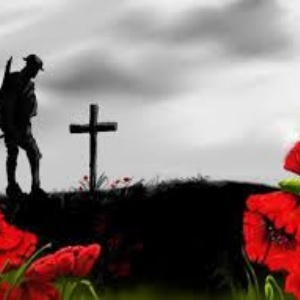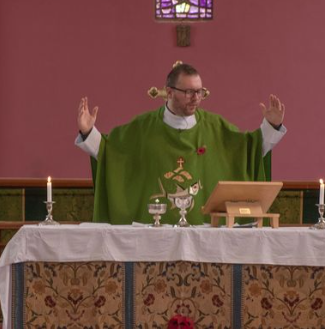- Home»
- News and Events»
- News strips and Photos»
- News - Published on the APP inc. from the Parish of St George and All Saints»
News from the churches 11.11.2024

Today we remembered those who gave their lives so we might be safe.
Friends,
How should we honour their memory? Fr Mike reflects: https://stgeorgechorley.co.uk/news/news_inner/353
Here is our notice sheet: https://stgeorgechorley.co.uk/brochure/theway.pdf
A hymn for Remembrance Sunday: https://www.youtube.com/watch?v=bvouc8Qs_MI
God bless,
Fr Mike
Dear All,
Don't forget to join us for 11am or 4pm today!
Today we celebrate remembrance Sunday and the feast of St Martin of Tours. If you have people that you would like to remember as we approach Advent and the Christmas season , you can take part in our memorial evensong on the 30th November at 4pm. Everyone is welcome!
Please find this week's sermon attached! ![]()
Fr Jordan
Talking about remembering is a pretty ironic thing for me. This week I’ve forgotten my keys and locked myself out of my house. I’m the exact sort of person who forgets where I’ve put my glasses when they’re on my face. When it comes to remembering I think we all have moments where we forget the unimportant every day things and it leads to us running around the house searching high and low in a mad panic.
That’s when people chime in with those helpful comments like “Where did you leave it last?” Which I’m convinced has NEVER helped anyone to find anything. Or when the witch hunt begins as I start to blame everybody else who’s ever touched the things I’m looking for, as if it’d every be anybody other than my own fault. All these unhelpful things come about because I just can’t remember where I’ve left something.
It’s frustrating when we forget, isn’t it? But while forgetting the little things is frustrating, if you know what it looks like when someone starts to forget the big things, it can be outright painful. Actually, it’s even harder to watch in someone else. I do a lot of work with those people, in places like Coniston house or Gillibrand Hall and families will often say that they feel a sense of loss, because the people aren’t really there anymore, sometimes they get glimpses, but the people that they knew, their families feel like they’re not really there anymore.
It’s not something we like to think about, but it’s like our memories are actually really important in a deeper way. It’s a bit like our memories are a part of who we are, isn’t it? And when we forget the really important things, it’s like we lose a part of what makes us, us. Remembering, it tells us who we are.
And the same is true for a group of people too. If you were to ask what people thought was important about the identity of our country today, they’d probably look back with pride on those times when we fought for freedom, those times when we did things that care for the poorest in society, starting the NHS, freedom from slavery, maybe some would look back and when we stood firm against the Nazis. We might also look back on some of the things we’ve done wrong as a nation, colonialism perhaps, and racism, but when we think of who we are as a people we look back at the whole picture, don’t we? It’s like by remembering, we get a sense of our identity as a nation. Remembering tells us who we are.
And, actually, the exact same is true for God’s people too. If you’ve ever looked into the Passover celebration for the Jewish people, you’ll realise that it’s an act of remembrance, they look back to the time when God freed them from slavery and that reminds them of who they are. They are a people who were liberated by God. And then they sort of re-enact the story in a certain way.
In fact, we, as Christians, do the exact same thing. We have these acts, these certain things we do, to help us to remember the time when God came to earth as a human to die for us, the time when he came to our rescue. That’s a big one. That’s worth remembering. That tells us something pretty important about who we are as a people, as humanity. We are the people that God died for. In our second reading today it says “God chose us to have salvation through our Lord Jesus Christ.”
I know some of you probably get a bit bored stiff during the Eucharistic prayer sometimes. Because if we don’t realise what happens during the Eucharistic prayer, then it just sounds like a long prayer. But what we’re doing when we gather together to share in the Eucharist, is a huge number of things, but one of those things that happens is we remember Jesus coming to earth, suffering, dying and rising, and we remember. We remember in the same way that Jesus taught us to remember, when he said take this bread, it’s my body broken, take this cup, it is blood outpoured. But by remembering, we’re doing more than just looking back, we are re-membering, making ourselves members once again, of what Jesus did. That’s what real remembering means, it means taking the memories and re-inhabiting them.
So when we share this meal together, we’re remembering. And by remembering we are told who we are and made a part once more of that memory. We are the people that Jesus came to earth for, suffered for, died for and rose again for. If you listen to the words I say during the Eucharist and all my little hand gestures, it’s not just a funny dance I’ve memorised, the whole prayer is a way for us to re-member ourselves to what Jesus once did – and actually there’s more to it than that, though that’s a part of what the Eucharistic prayer does.
By remembering we’re told who we are.
But even more so, as much as we’re called to look back and remember our history as God’s people. We’re also called to look back and remember our own mistakes as a species. We should look back at our mistakes and our successes and remember. Especially today, we remember all those who died in wars, some great number, very needlessly, though no less bravely. But as we look back, we remember who we are. We are people who learnt some terrible lessons at an enormous cost. We need to learn from our past mistakes or else we’ll end up paying the price again, maybe even a larger price next time.
So it is our duty to remember, as it will tell us who we are.
And as we remember our past, both as a nation but also as God’s people, we are called to live a different way. We are called to live in a way that puts the least in our society first. We’re told in our gospel reading, that when we care for the least in our society, it’s as if we’re caring for him. That when we feed the hungry it’s as if we feed him.
Learning the lessons of the past should make us less selfish, and more inclined to help others. It should change who we are. If we truly remember, if we truly re-member ourselves to God’s story, then we too should want to be like him who became less to lift us up, we too should want to lift others up even at our own expense.
Today we remember those who gave everything for us. And in remembering we should be changed by the knowledge of who we are. We remember the soldiers who died bravely, and the God who died humbly. We remember and are changed, especially as we gather around to share the Eucharist together.
I wonder what ways you might be changed today. Maybe you could do something different this week, as you reflect on the sacrifice of everything that was given up for you. You have been loved so maybe you could love. Maybe you could think of someone you know who has nothing and could care for them this week. Maybe you could give up your time or your skills, as others gave things up for you, to help someone else. Maybe you could just make time to remember this week, the sacrifices of others that were made for you. In whatever way you do it, remember and may it tell you who you are, and may you respond not just in your head but in your heart too. Amen.

